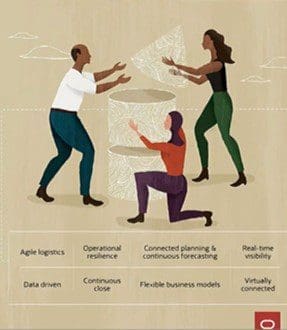 Oracle hosted its Oracle Live: Cloud Applications event on September 29. The event keynote focused on the cloud computing technologies that deliver value across a wide-range of Oracle enterprise applications. Supply chain was a prominent topic in the keynote due to the extensive supply chain disruptions caused by the global coronavirus pandemic. These disruptions have elevated the supply chain function to the boardroom level of corporations across industries and around the globe. I found the supply chain sessions to be particularly interesting. In today’s chaotic environment, it was nice to see a comprehensive, well-structured overview of the supply chain trends at hand, factors at play, and the technology solutions that enable success.
Oracle hosted its Oracle Live: Cloud Applications event on September 29. The event keynote focused on the cloud computing technologies that deliver value across a wide-range of Oracle enterprise applications. Supply chain was a prominent topic in the keynote due to the extensive supply chain disruptions caused by the global coronavirus pandemic. These disruptions have elevated the supply chain function to the boardroom level of corporations across industries and around the globe. I found the supply chain sessions to be particularly interesting. In today’s chaotic environment, it was nice to see a comprehensive, well-structured overview of the supply chain trends at hand, factors at play, and the technology solutions that enable success.
Oracle Cloud SCM
Rick Jewell suggested in the Oracle Cloud SCM session that global supply chains have depended on a certain level of predictability that is no longer available. He proposed that there needs to be a deemphasis on efficiency and a shift to a multidimensional value framework that places increased emphasis on supply alternatives, risk exposure, tariffs, and channel complexity. Many of my recent discussions with supply chain technology providers suggest that supply alternatives and risk mitigation efforts are being enacted. For example, decentralized warehousing strategies are being further considered for their risk reduction from incidents such as government mandated regional travel restrictions, facility outbreaks of Covid-19, and similar supply chain disruptions.
Rick Jewell noted several factors beyond the global pandemic that are necessitating this shift to a multidimensional value framework. There are globalization realignments that are increasing risk and reducing predictability, rapid technology innovation enabling new capabilities, and market trends that are shifting the basis of competition. As an example of a market trend, Mr. Jewell noted the concept of “servitization”, or the expansion of business relationships from transactions to ongoing relationships that include service agreements. I see servitization in many industrial and technology markets. In fact, it is expanding rapidly in the warehouse automation market as providers continue to increase their post-project support businesses. Similarly, manufacturer-based service of complex industrial technologies, such as turbine engines, has been increasing for years. In both instances service agreements provide an ongoing revenue stream to the providers while elevating the relationship from transactional to an ongoing partnership.
Mr. Jewell also noted the increased value associated with speed and agility that can be achieved by geographic proximity of production and consumption, improved demand forecasting, and a more rapid pace of innovation. Additive manufacturing is viewed by many as a means toward this end. However, I believe the nimble operations of fashion brand Zara more holistically capture this shift in competitive approach. Of course, the Oracle session did tie the increased emphasis on supply chain agility to the features within the Oracle Cloud SCM suite of solutions that support agility. These Cloud enabled features include built in flexibility, a unified data model, and easy access to ongoing updates and innovation.
Oracle Customer “Case-in-Point”
Cohu, a global provider of equipment and services for back-end semiconductor manufacturing, discussed its recent big-bang implementation of 55 Oracle products. The company’s business strategy is based on growth, including growth through acquisitions. The history of acquisitions to date resulted in a large set of decoupled systems with siloed data. Cohu chose Oracle Cloud because it provides the flexibility, scalability and integration capabilities it requires. Cohu is now taking advantage of new versions of software every 90 days, and is positioned to leverage Oracle Cloud’s scalable, unified system to support future growth.
Juniper Networks also discussed its use of Oracle Cloud SCP. From an operations perspective, the company discussed the importance of integrated business planning and S&OP to flexibly align operations with rapidly evolving supply and demand patterns. From a technology perspective, Juniper Networks highlighted the importance of a common data model, a rich set of REST APIs, and practical benefits of a phased implementation approach of Supply Planning, Global Order Promising, S&OP, Backlog Management, and Demand Management.
Final Word
Oracle stated it has over 2,800 Oracle Cloud SCM customers, with over half of those currently live. The company directly stated “The Time is Now” to partner with Oracle. However, this commercial proposition was supported with a comprehensive and well-structured overview of the current operating environment that then aligned Oracle SCM Cloud capabilities with these requirements, further supported by customer success stories.

















